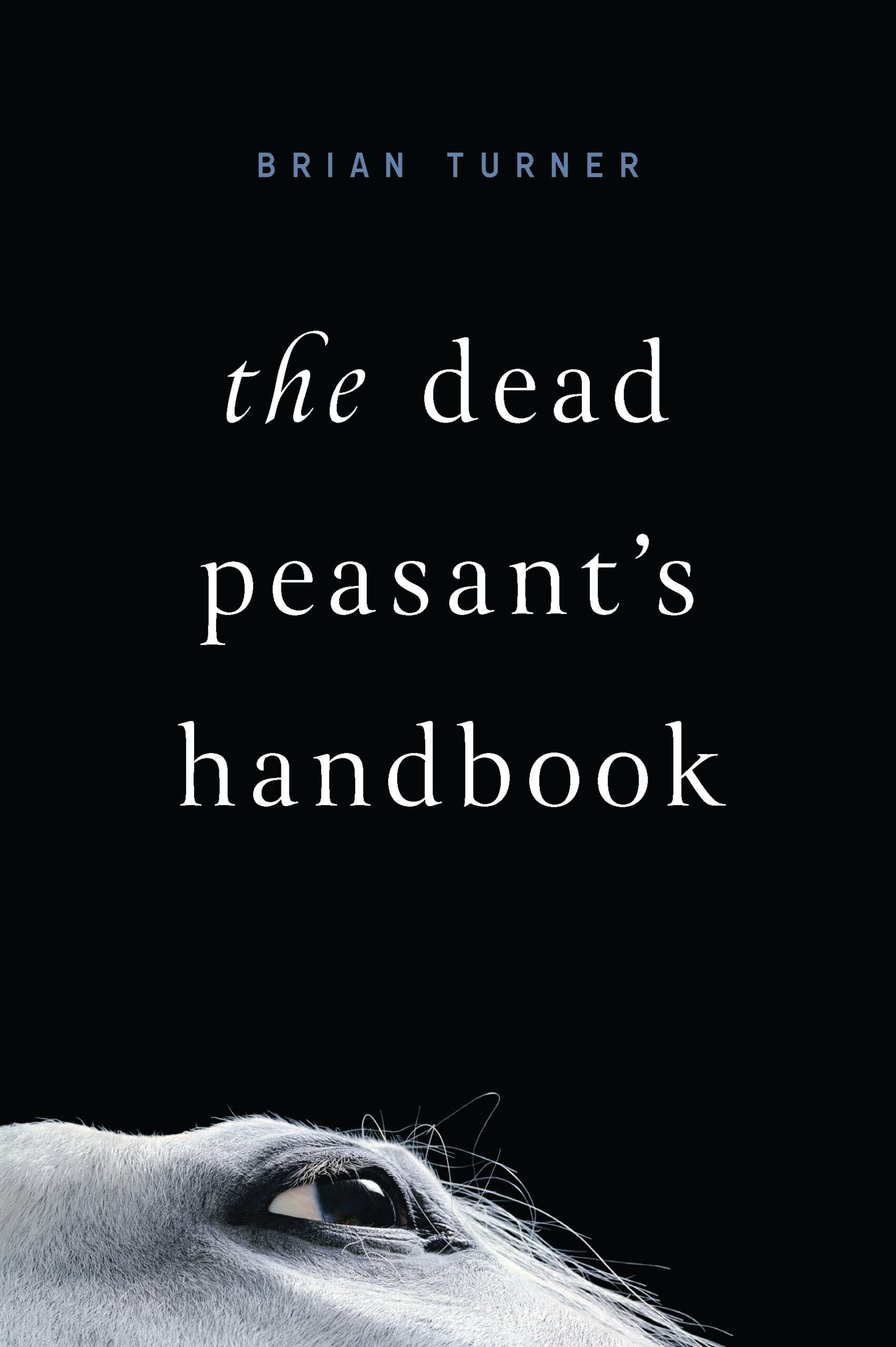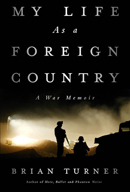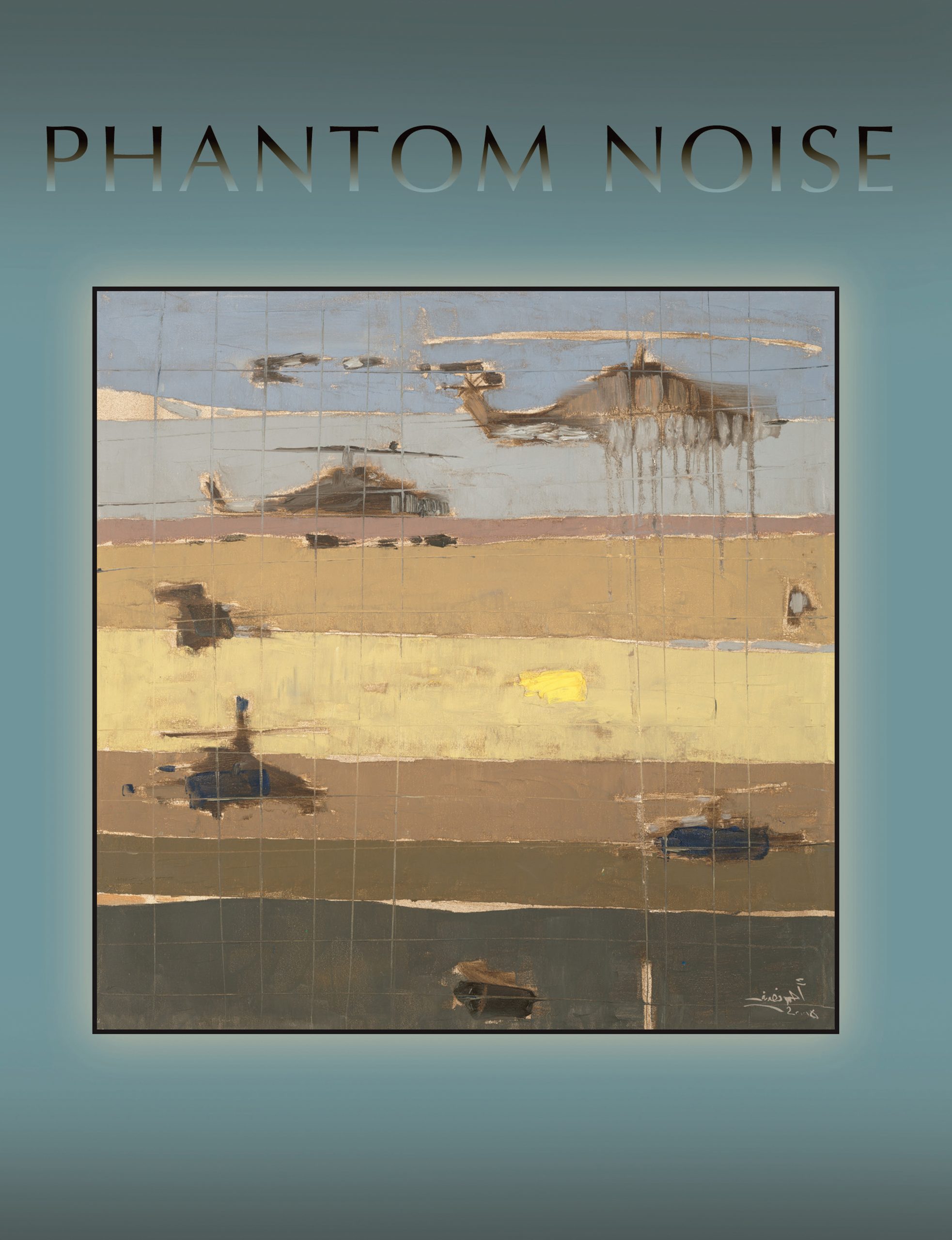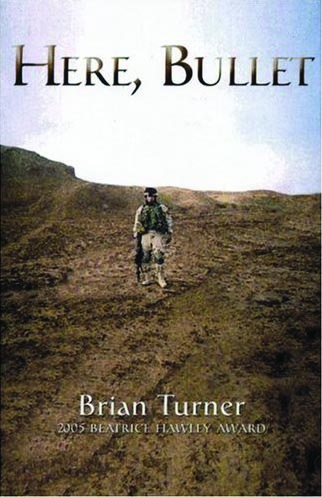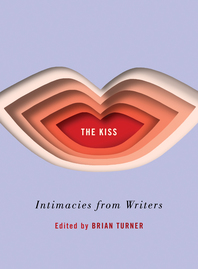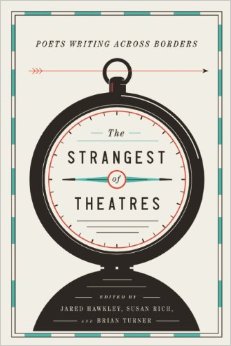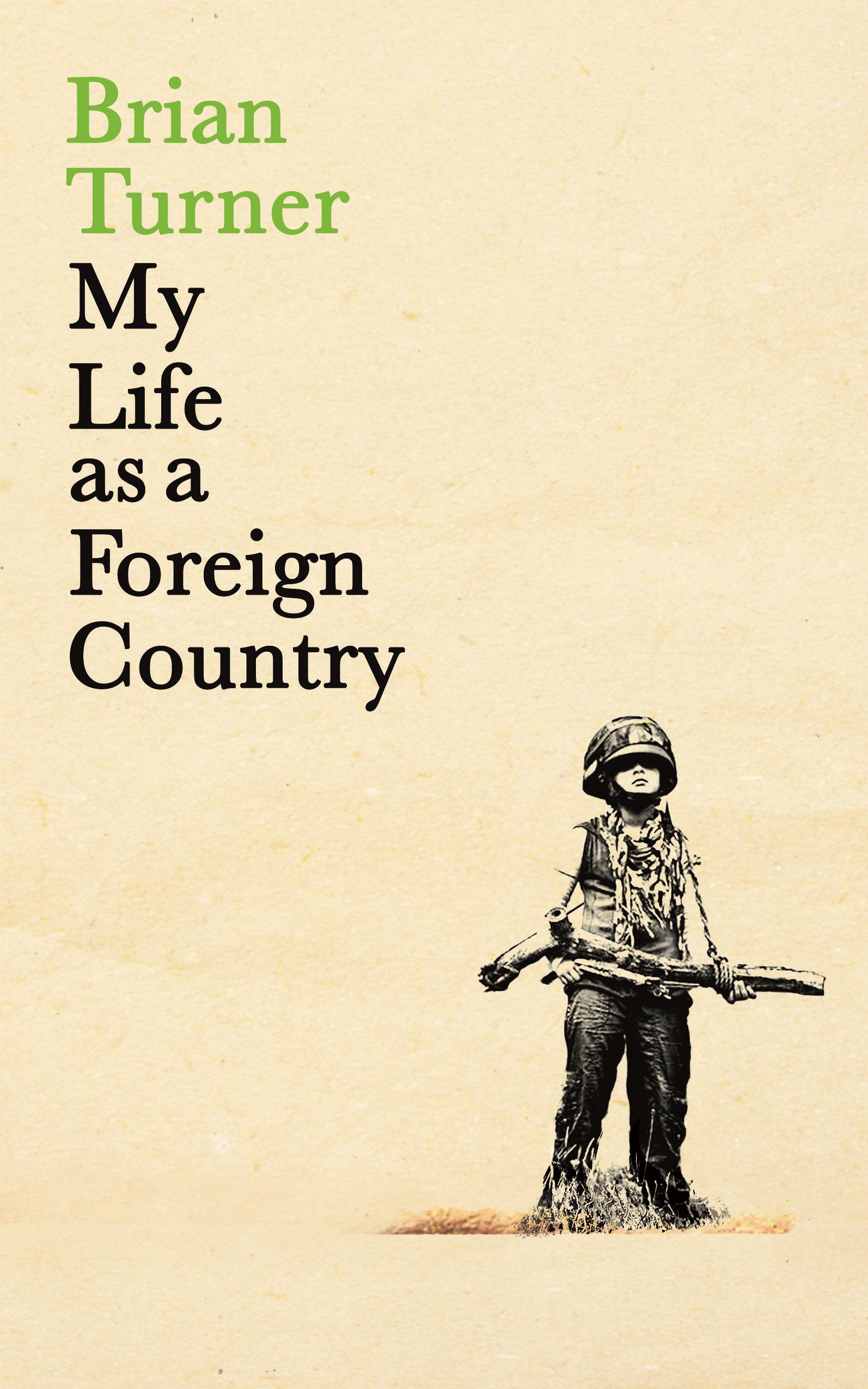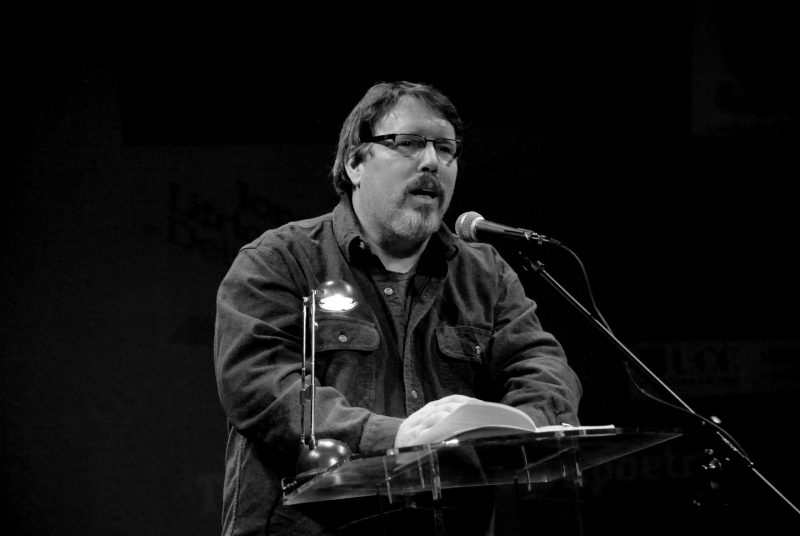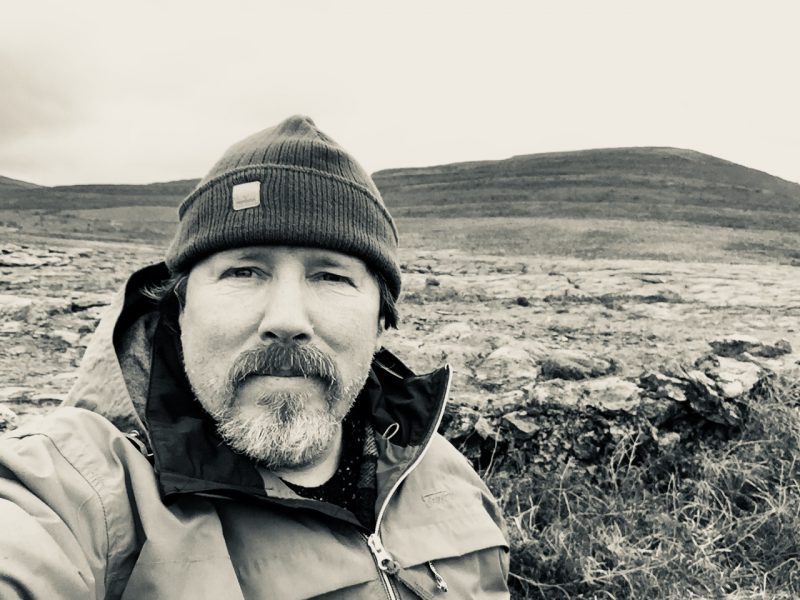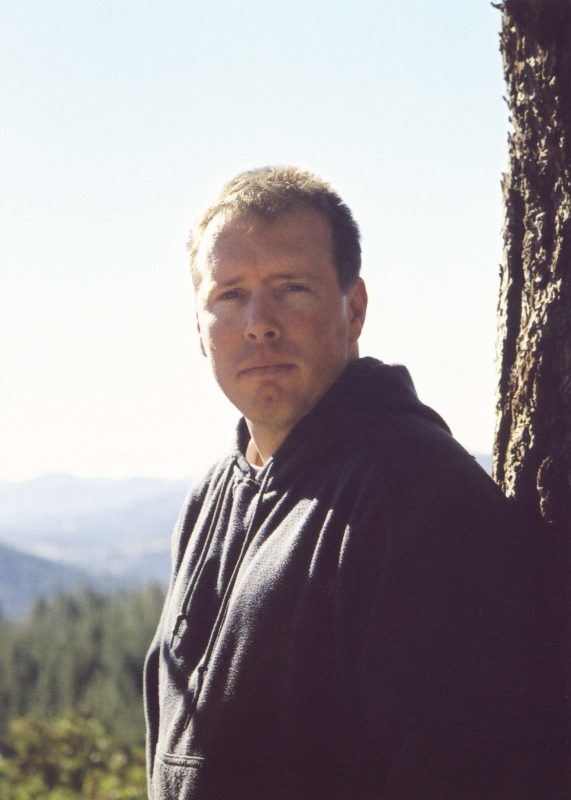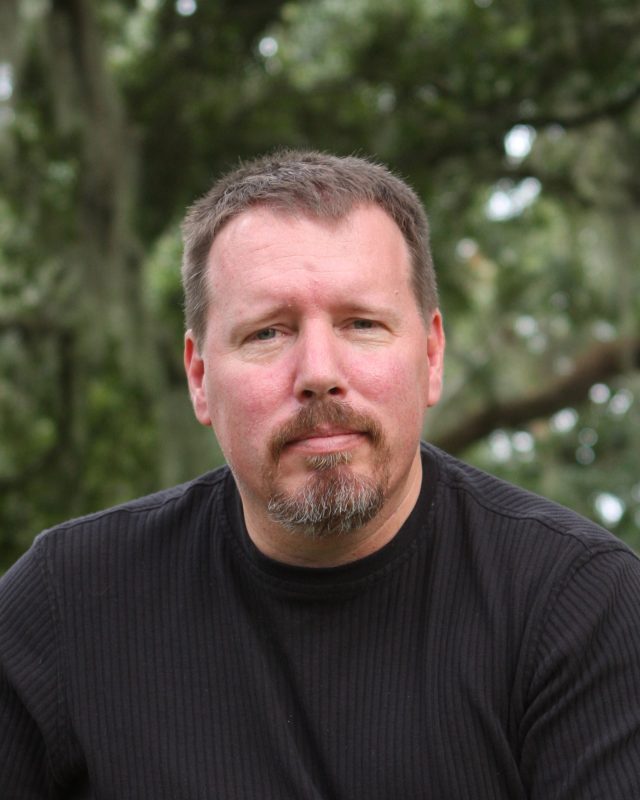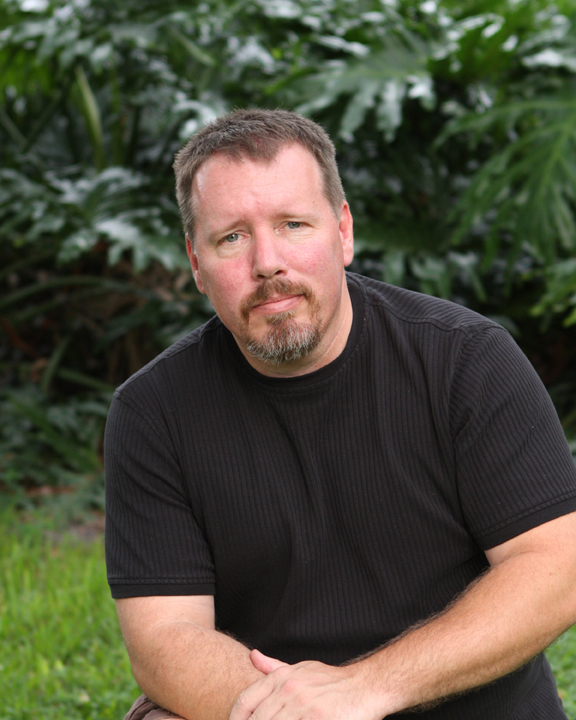

Brian Turner
Award-winning Poet & Memoirist
Author of Here, Bullet
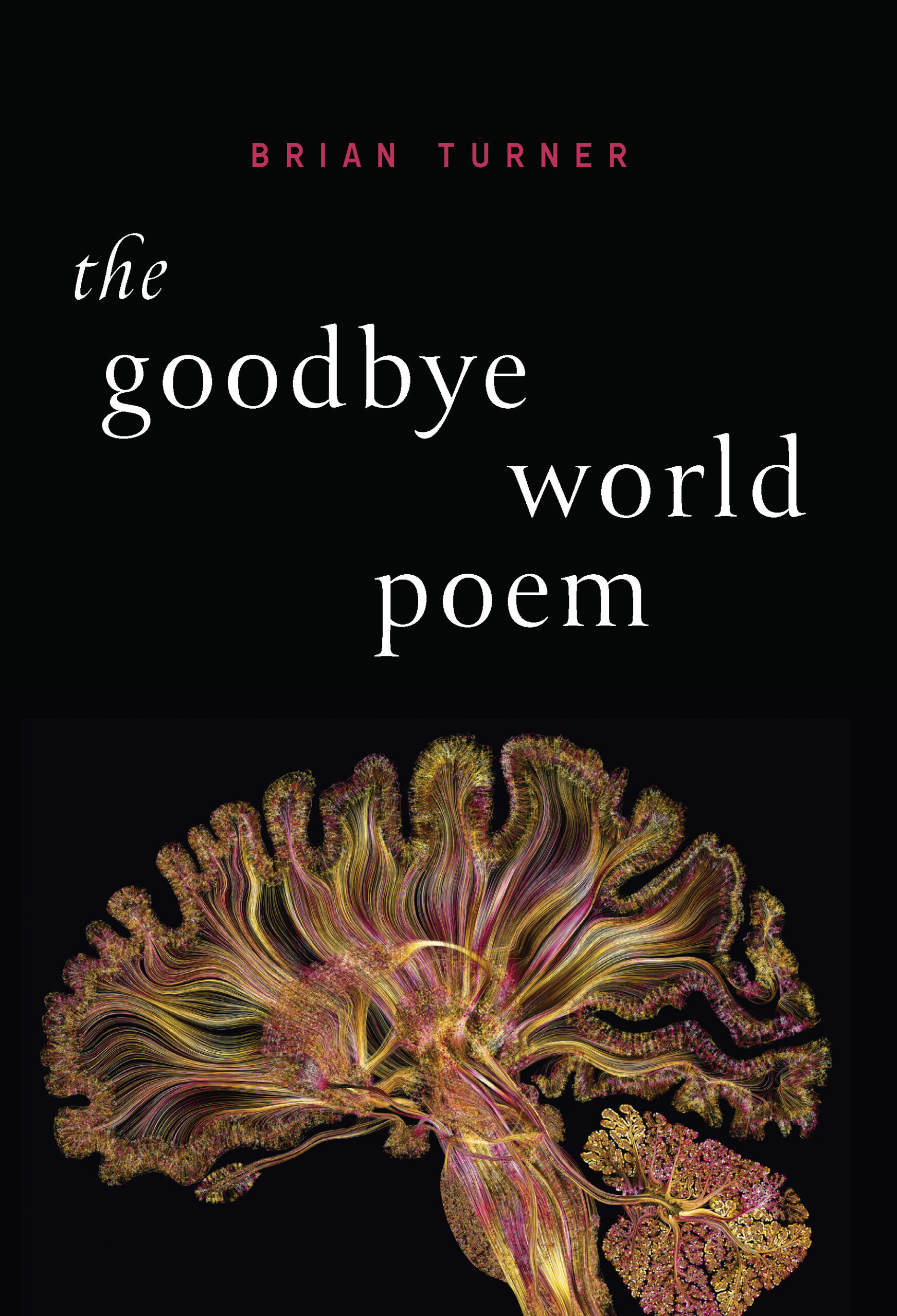
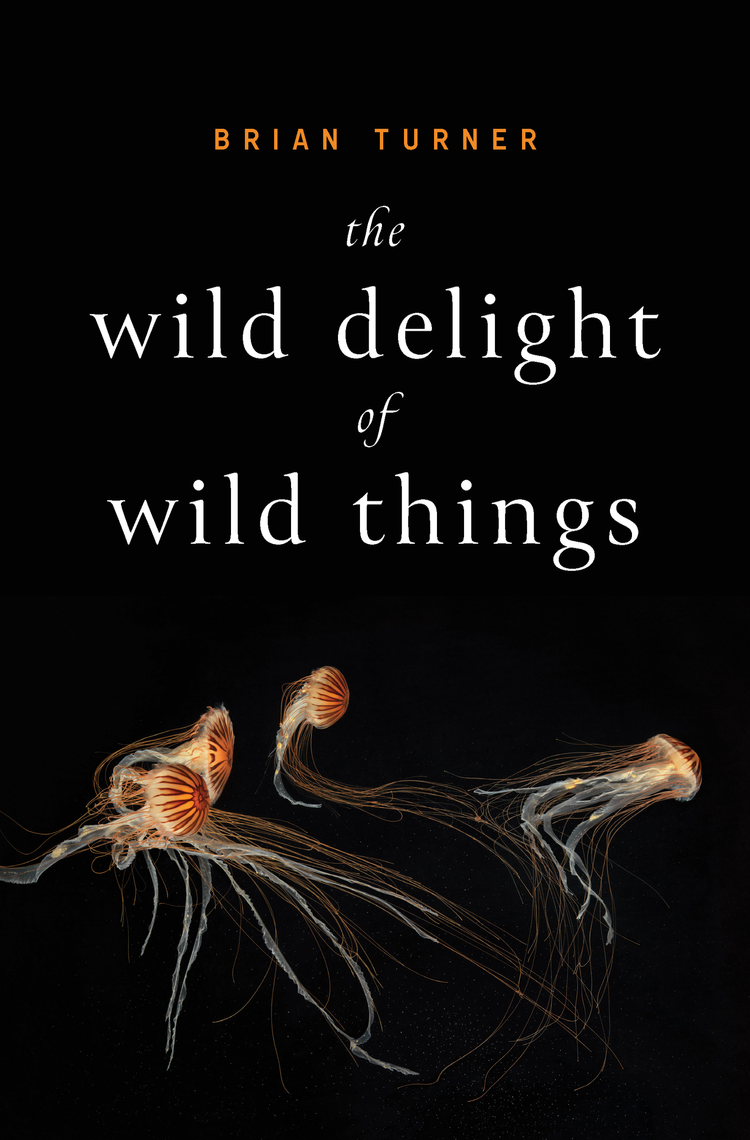
Readings &
Lecture Topics
- The Soldier’s Rucksack
- The Landscape of War: Love & Loss
- The Poetry of Work, Labor, and Love
- Fragmentation & Braiding: Memory in Memoir
- An Evening with Brian Turner
Biography
“The day of the first moonwalk, my father’s college literature professor told his class, ‘Someday they’ll send a poet, and we’ll find out what it’s really like.’ Turner has sent back a dispatch from a place arguably more incomprehensible than the moon—the war in Iraq—and deserves our thanks…” —New York Times Book Review
“In Brian Turner’s extraordinarily capable hands, language is war’s undoing, in the sense that his words won’t allow absurdity and terror to be anything less than real.” —Mark Doty
“[Turner] is a writer who is less warrior than observer, someone whose curiosity, knowledge and tenderness allow insight into landscapes and people that terrify the rest of us….Turner shows us soldiers who are invincible and wounded, a nation noble and culpable, and a war by turns necessary and abominable.” —The Washington Post
Brian Turner is the author of five collections of poetry, most recently: The Wild Delight of Wild Things (2023), The Goodbye World Poem (2023), and The Dead Peasant’s Handbook (2023), all with Alice James Books. This trilogy of books traverses the landscape of loss, sitting quietly in the grief of afterwards before allowing oneself to gravitate again towards delight and wonder. Some of his other collections include Here, Bullet (2005), winner of the 2005 Beatrice Hawley Award, the New York Times “Editor’s Choice” selection, the 2006 PEN Center USA “Best in the West” award, and the 2007 Poets Prize; and Phantom Noise (2010). He is also the author of the memoir My Life as a Foreign Country, which made Powell’s Best Nonfiction of 2014 list.
My Life as a Foreign Country (2014) follows the experience of one soldier in one recent war—the preparations, actions, homecomings, and infinite aftermath—but then explodes from those narrow limits. Turner’s account combines recollection and imagination and leaps centuries and continents to seek parallels in the histories of other men. The result is an opportunity to enter the head of a man still stalked by war, to experience conflict with new definition and lasting effect. Benjamin Busch calls the memoir a “brilliant fever dream of war’s surreality, its lastingness, its place in families and in the fate of nations. Each sentence,” he says, “has been carefully measured, weighed with loss and vitality, the hard-earned language of a survivor who has seen the world destroyed and written it back to life.” Jen Percy in the New York Times Sunday Book Review declared, “My Life as a Foreign Country is a triumph of form and content, and a praiseworthy example of how the empathetic imagination can function beautifully in nonfiction writing…. History can only be served by this kind of attention.”
Turner served seven years in the US Army, including one year as an infantry team leader in Iraq with the 3rd Stryker Brigade Combat Team, 2nd Infantry Division. Prior to that, he was deployed to Bosnia-Herzegovina in 1999-2000 with the 10th Mountain Division. In his poetry and prose, Turner conveys both elegant and devastating portraits of what it means to be a soldier and a human being.
In addition to his poetry and memoir, Turner is the editor of The Kiss and co-editor of The Strangest of Theatres anthologies. A musician, he has also written and recorded several albums with The Interplanetary Acoustic Team, including 11 11 (Me Smiling) and The Retro Legion’s American Undertow.
Turner’s poems and essays have been published in The New York Times, The Guardian, National Geographic, Harper’s, among other fine journals, and he was featured in the documentary film Operation Homecoming: Writing the Wartime Experience, which was nominated for an Academy Award. A Guggenheim Fellow, he has received a USA Hillcrest Fellowship in Literature, the Amy Lowell Traveling Fellowship, the Poets’ Prize, and a Fellowship from the Lannan Foundation. His poems have been published and translated into Arabic, Chinese, Dutch, French, German, Hebrew, Italian, Polish, Serbo-Croatian, Spanish, Swedish, and more.
He lives in Orlando, Florida, with his dog, Dene, the world’s sweetest golden retriever.
Short Bio
Brian Turner is the author of five collections of poetry, most recently: The Wild Delight of Wild Things (2023), The Goodbye World Poem (2023), and The Dead Peasant’s Handbook (2023), all forthcoming with Alice James Books. His other collections include Here, Bullet to Phantom Noise, and the memoir My Life as a Foreign Country. He is the editor of The Kiss and co-editor of The Strangest of Theatres anthologies. A musician, he has also written and recorded several albums with The Interplanetary Acoustic Team, including 11 11 (Me Smiling) and The Retro Legion’s American Undertow. His poems and essays have been published in The New York Times, The Guardian, National Geographic, Harper’s, among other fine journals, and he was featured in the documentary film Operation Homecoming: Writing the Wartime Experience, which was nominated for an Academy Award. A Guggenheim Fellow, he has received a USA Hillcrest Fellowship in Literature, the Amy Lowell Traveling Fellowship, the Poets’ Prize, and a Fellowship from the Lannan Foundation. He lives in Orlando, Florida, with his dog, Dene, the world’s sweetest golden retriever.
Visit Author WebsiteVideos
Publications
The Dead Peasant's Handbook
Poetry, 2023
“Brian Turner possesses the extraordinary capacity to transform grief into art, whether intimate or collective, immediate or historical, illuminating that anguish so that we may learn, survive, even flourish in its wake. Known as a war poet, Turner writes with great moral authority on war, in ‘Historians’—about the inheritance of military mentality and machinery—or the stunning ‘Horses,’ an exploration of the tension between the beauty of these animals and the terrible uses to which they have been put, the arc over centuries from slaughter perpetuated by cavalry on the battlefield to the repression of protest in the streets. Everywhere there are the lessons of hidden history carved in images, as with ‘Vollum 14578,’ about a cruel anthrax experiment carried out on sheep. Yet, Turner believes in the redemptive power of love against death, demonstrated by the wrenching poem ‘Wedding Vows,’ and the refusal to speak the words ‘till death do us part’ as part of those vows—a refusal only validated by death, since the love stubbornly refuses to die. Again and again, Brian Turner subjects his trauma to the demands of his craft, offering the gift of lyrical consolation even when that consolation is beyond the reach of the poet.” —Martín Espada
Following the loose series of Turner’s other recent 2023 publications, The Wild Delight of Wild Things and The Goodbye World Poem, this third book in this “collection” serves as a poetic guide to help us navigate the world we live in. The Dead Peasant’s Handbook begins with the difficulty and hardship of living in the world after losing a loved one before allowing oneself to gravitate again towards delight and wonder. With deep dives into history, the poems traverse the wild terrain of our lives, and it remains ever-constant to the theme at the core of all three recent books—that of love and loss. The poems take their structure from guidebooks, featuring subject areas connected to the general experience of being human: war and conflict, dreams, love and loss, and survival. The book itself takes its title from an insurance industry policy (“Dead Peasants”) in which companies can take out insurance on their workforce in case of loss or death—sometimes without employees knowing. And so, this book is also a commentary on the people and moments that are too often elided over and given the vault of silence, and maybe lost to time.
The Goodbye World Poem
Poetry, 2023
While Turner (author of Here, Bullet) grieves the loss of his wife to cancer, The Goodbye World Poem is a series of poetic meditations that sit quietly in the silent “afterward” of someone’s death. Losing his wife, his father, and his best friend in quick succession, Turner explores those relationships through the complicated lenses of moments in time, weaving in and out of memory to explore the disparate history that fuses together to form ones psyche. Throughout the collection, a prevailing motion recurs: that of submersion, sinking, plunging into the deep—whether it be the ocean or the subconscious. In other words, this book is a kind of poetic biography, a journey of the self that ultimately pours everything that’s happened in a life—all of the love and all of the loss—into the moment of death itself. The poems are meant to be celebratory and sublime in their comprehension of what happens to our memories when we die. And, if the reader is inclined—the reader becomes the vessel who holds all of this in their own imagination, carrying Turner and his memories forward into their own lives in a small way.
The Wild Delight of Wild Things
Poetry, 2023
“Brian Turner’s The Wild Delight of Wild Things brought me to my knees, kissed the top of my head, and gently gave my heart back to me. What do we mean when we say we loved and lost someone? This profoundly beautiful book begins inside a life-changing relationship and extends with graceful tendrils out into the world, reminding us that by sharing our experiences we make an endless spiral form stretching out to everyone and everything. A tender heart curl. An epic love poem.”
—Lidia Yuknavitch
Although grief is at the forefront of these poems, The Wild Delight of Wild Things is a simple love letter to Turner’s late wife, poet Ilyse Kusnetz (1966-2016). The poems are also a love letter to our planet during the ongoing sixth mass extinction. Intertwining this immense grief, Turner explores the hybrid borderlands of genre, and the meditations on love and loss blur the boundaries between poetry and lyric prose. In Italian, the word “stanza” is rooted in the word “room.” And so, stanza by stanza, room by room, page by page, we draft ourselves forward into the imagination, our arms filled with all that we can carry from the days gone by. This is the art of survival. Profound grief teaches us how to dwell in the house of memory—that vibrant temporal landscape of the past—where we might live with the dead we love once more.
My Life as a Foreign Country
Memoir, 2014
“My Life as a Foreign Country is brilliant and beautiful. It surely ranks with the best war memoirs I’ve ever encountered—a humane, heartbreaking, and expertly crafted work of literature.” —Tim O’Brien, author of The Things They Carried
A war memoir of unusual literary beauty and power from the acclaimed poet who wrote the poem “The Hurt Locker.” In 2003, Sergeant Brian Turner crossed the line of departure with a convoy of soldiers headed into the Iraqi desert. Now, each night beside his sleeping wife, he imagines himself as a drone aircraft, hovering over the terrains of Bosnia and Vietnam, Iraq and Northern Ireland, the killing fields of Cambodia and the death camps of Europe—a landscape of ongoing violence, revealing all that man has done to man. In this breathtaking memoir, Turner retraces his war experience—pre-deployment to combat zone, homecoming to aftermath. Free of self-indulgence or self-glorification, his account combines recollection with the imagination’s efforts to make reality comprehensible. Across time, he seeks parallels in the histories of others who have gone to war, especially his taciturn grandfather (World War II), father (Cold War), and uncle (Vietnam). Through it all, Turner paints a devastating portrait of what it means to be a soldier and a human being.
Phantom Noise
Poetry, 2010
“With courage and an uncommon willingness to see the world as it actually is, Brian Turner returns with a bullet-borne language in which helicopters hover like spiders over a film of water. His poem “Al-A’imma Bridge” alone proves his mastery, and joins him to the tradition of Wilfred Owen and David Jones, for he is their descendent, his poetic gifts detonated into a spray of lyric force that will mark what is possible in poetry for years to come, a chiseling of agony onto paper and a poignant cri de Coeur to the republic of conscience.” —Carolyn Forché
“Shaped by his time spent serving in Iraq, American soldier Brian Turner’s first collection, Here, Bullet, depicted combat with a mixture of bleak reality and disturbing surrealism. His second, Phantom Noise, also bristles with war’s devastations, but here conflict appears in flashbacks set against the backdrop of the poet’s Californian home. Turner’s is a world where even a visit to the local hardware shop opens on to artillery fire: a spilled “50 pound box of double headed nails” that pour on to the floor “constant as the shells / falling south of Baghdad.” The poems often read as an attempt to explain, understand and come to terms with the terrible things soldiers witness and are party to: the language sparse and precise, the tone questing and urgent. Yet the writing is rarely prescriptive, leaving interpretation open. Almost miraculously, there is also much sensitivity: “Al-A’imma Bridge” is a nightmarish account of the 2005 Tigris River disaster, yet finds “flowers that may light the darkness” to commemorate those who lost their lives. Turner’s resilient, humane poems remind us of war’s impact but also provoke and question.” —The Guardian
Here, Bullet
Poetry, 2005
A harrowing, beautiful first-person account of the Iraq War by a soldier-poet. The poems in Here, Bullet were written in his notebooks while he served in Iraq. Adding his voice to the current debate about the US occupation of Iraq, in poems written in the tradition of such poets as Wilfred Owen, Yusef Komunyakaa (Dien Cai Dau), and Bruce Weigl (Song of Napalm), Iraq war veteran Brian Turner writes powerfully affecting poetry of witness, exceptional for its beauty, honesty, and skill. Based upon Turner’s year-long tour in Iraq as an infantry team leader, the poems offer gracefully-rendered, unflinching description but, remarkably, leave the reader to draw conclusions or moral lessons. Here, Bullet is a must-read for anyone who cares about the war, regardless of political affiliation.
The Kiss
Anthology, 2018
A deliciously diverse anthology of essays, stories, poems, and graphic memoirs, where writers explore the deeply human act of kissing.From Sioux Falls to Khartoum, from Kyoto to Reykjavik; from the panchayat forests of India to the Giant’s Causeway on the coast of Northern Ireland; in taxis and at bus stops, in kitchens and sleigh beds, haystacks and airports around the globe—people are kissing one another. The sublime kiss. The ambiguous kiss. The devastating kiss. The kiss we can’t take back. The kiss we can never give. The kiss that changes a life. In this anthology, writers and thinkers share their thoughts on a specific kiss—the unexpected and unforgettable—in an attempt to bridge the gulf, to connect us to one another on a deeply human level, and to explore the messy and complicated intimacies that exist in our actual lives, as well as in the complicated landscape of the imagination. This is a book meant to be read from cover to cover, just as much as it’s meant to be dipped into—with each kiss pulling us closer to the moments in our lives that matter most.
Articles & Audio
Read What’s In Print
• How to Fall In Love With the World Again – New York Times
• Interviews: A Conversation with Brian Turner – World Literature Today
• Turner Reviews the Film American Sniper — Vulture
• Review of My Life as a Foreign Country — New York Times Sunday Book Review
• Interview with Brian Turner — The Rumpus
• Brian Turner on Capturing Complexity — Brevity
• A Poet Parses the Legacy of War: Interview with Brian Turner — NPR
• Roxana Robinson Reviews My Life as a Foreign Country — Washington Post
• “To Bedlam and Back”: Brian Turner on the Iraq War — New York Times
• An Excerpt from My Life as a Foreign Country — Guernica
• Review of Phantom Noise — Washington Post
• Interview with Brian Turner — Best American Poetry
• “Baghdad After the Storm”: Brian Turner on Baghdad — National Geographic
Listen to Audio
• The Art of Writing About War – and War Makers — Nevada Public Radio
Selected Writings
MY LIFE AS A FOREIGN COUNTRY (excerpt)
I am a drone aircraft plying the darkness above my body, flying over my wife as she sleeps beside me, over the curvature of the earth, over the glens of Antrim and the Dalmatian coastline, the shells of Dubrovnik and Brcko and Mosul arcing in the air beside me, projectiles filled with poems and death and love.
…
Each night I do this, monitoring heat signatures in the landscape, switching from white-hot to black-hot lenses as I bank and turn, gathering circuit by circuit the necessary intelligence, all that I have done, all that we have done, compressed into the demarcations in the map below.
HERE, BULLET
If a body is what you want,
then here is bone and gristle and flesh.
Here is the clavicle-snapped wish,
the aorta’s opened valves, the leap
thought makes at the synaptic gap.
Here is the adrenaline rush you crave,
that inexorable flight, that insane puncture
into heat and blood. And I dare you to finish
what you’ve started. Because here, Bullet,
here is where I complete the word you bring
hissing through the air, here is where I moan
the barrel’s cold esophagus, triggering
my tongue’s explosives for the rifling I have
inside of me, each twist of the round
spun deeper, because here, Bullet,
here is where the world ends, every time.
—from Here, Bullet
ASHBAH
The ghosts of American soldiers
wander the streets of Balad by night,
unsure of their way home, exhausted,
the desert wind blowing trash
down the narrow alleys as a voice
sounds from the minaret, a soulful call
reminding them how alone they are,
how lost. And the Iraqi dead,
they watch in silence from rooftops
as date palms line the shore in silhouette,
leaning toward Mecca when the dawn wind blows.
—from Here, Bullet
A LULLABY FOR BULLETS
Tomorrow is made of shrapnel
and blood. There will come a time
when the trigger calls you out quickly
to the streets. And as you leave the barrel,
I can’t promise you won’t kill the man
who has waited all his life for the answer
to this moment, but if you lean to the right,
if you lean back and look as hard as you can
for that mountain you came from, sunlight
warming the pines, clouds approaching
from the north with a gift of silence,
if you do this you might just graze
the man’s temple, so close you might hear
his name, the humming of blood
over bone, the many voices
within, the years to come.
—from Phantom Noise
AMERICAN INTERNAL
Down in the hole, down in the clay and mud,
we dig. The noon sun hot on our backs
as we bend to the task, as if digging
down into our own shadows
with the stained shovels of our hands,
digging until someone gasps-another,
they have discovered another; with pale eyes,
the dead faces rooted with worms and stone,
brassy shells of bullets in their mouths,
hands reaching for what no one else can see above,
as if desperate to embrace us. We raise each
carefully from the earth, the bodies of men
dressed in sandals and thawbs,
wet robes of cotton dyed by clay,
and women, like the one I lift now,
how her hair unravels in a sheen
of copper, cold as the water in my palms.
—from Phantom Noise

